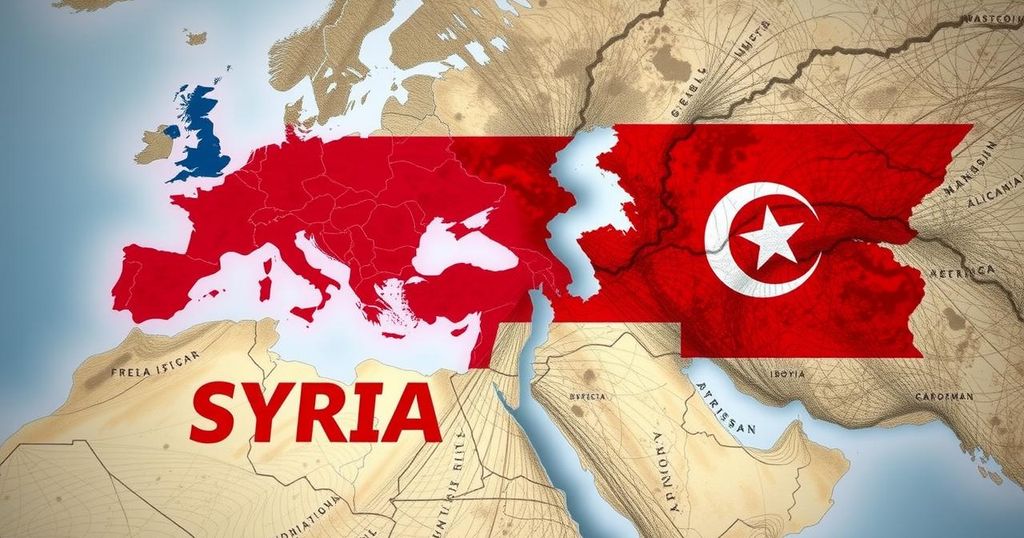Russia’s Strategic Shift: From Syria to Libya and the West’s Response

Russia is transitioning its focus from Syria to Libya following the collapse of Assad’s regime, revealing the tenuous nature of its alliances. The Kremlin aims to solidify its influence in the Mediterranean by supporting General Khalifa Haftar, reflecting continuity in its foreign policy framework. This shift underscores the need for the West to reassess its strategies and prevent external exploitation in Libya through strengthened governance and economic resilience efforts.
Russia is orchestrating a delicate shift from its involvement in Syria to engagement in Libya, signaling significant geopolitical changes. The recent collapse of Syria’s governance under Bashar al-Assad illustrates the instability of alliances tethered to coercion and mutual convenience. Armed with Russian support, Assad’s regime failed to sustain itself against both domestic upheaval and external pressure, exposing the fragility of such partnerships.
In light of these developments, Russia is realigning its military resources towards Libya, with General Khalifa Haftar poised to exert influence in Cyrenaica. This move demonstrates a continuity in Russia’s strategic objectives rather than merely substituting one ally for another. Notably, Russia’s historical ambition in the Mediterranean reflects long-term aspirations to expand its reach beyond regional confines.
The dynamics between Assad and Haftar reveal that both leaders, reliant on Russian patronage, navigate similar paths of power that ultimately hinge on foreign backing. Russia utilizes these figures to challenge Western interests and exploit regional discord, yet both authorities exhibit inherent vulnerabilities that could lead to their downfall. The West’s past disengagement has allowed external powers, including Russia and Turkey, to gain footholds in Libya, necessitating a strategic reassessment of its interactions in this arena.
Current Western strategies, attempting to realign Haftar’s loyalties away from Moscow, underestimate the extent of his dependence on Russian military and logistical support. The ties that bind Haftar to Russia through the Wagner Group and financial mechanisms exemplify a relationship where coercion replaces genuine loyalty. Therefore, Washington’s approach must shift towards strengthening Libya’s governance structures to counteract external exploitation effectively.
The implications of Russia’s increasing influence in Libya underscore the importance of coherence in Western policy. Active engagement and support for bolstering Libya’s political and economic resilience will mitigate vulnerabilities that foreign actors attempt to exploit. As Russia pivots towards Libya for its geopolitical gains, the West must prioritize stability and long-term strategies rather than reactive measures, emphasizing the need for accountability within Libya’s institutions to safeguard against external manipulation.
The article addresses Russia’s strategic realignment from Syria to Libya, highlighting the fragility of alliances formed through coercion. It emphasizes the shift in Russian foreign policy following the recent collapse of Bashar al-Assad’s regime, illustrating how the Kremlin is now focused on leveraging General Khalifa Haftar in Libya to enhance its geopolitical influence. The overall analysis underscores the risks posed by such dependencies and the inadequacy of current Western strategies in mitigating Russia’s actions in the region.
Russia’s strategic shift from Syria to Libya illustrates its persistent quest for regional influence despite the instability of its alliances. The Kremlin’s reliance on figures like Haftar raises concerns over the transactional nature of such partnerships, which may lead to vulnerabilities. For the West, the challenge lies in recalibrating its approach, focusing on promoting governance and stability in Libya rather than merely reacting to Russian maneuvers. A more proactive stance is essential to counteract external exploitations and reinforce Libya’s sovereignty.
Original Source: www.atlanticcouncil.org






